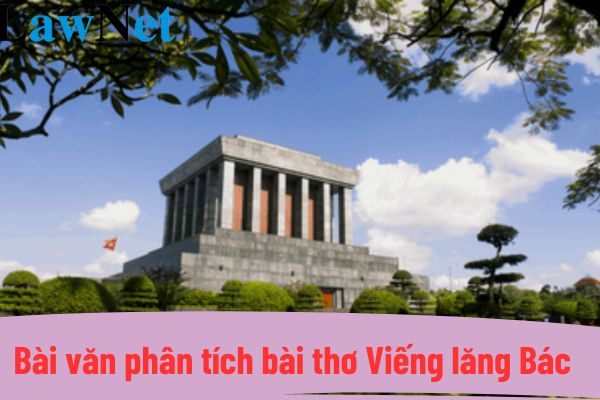Vietnam: What is the sample analysis essay on the poem "Viếng lăng Bác"? What are the assessment levels for training results of 9th-grade students in the entire school year?
What is the sample analysis essay on the poem "Viếng lăng Bác"?
Analyzing the poem "Viếng lăng Bác" involves delving deeply into the exploration and clarification of the contents and artistic values of the work. Through this, we better understand the emotions and thoughts of the author, Vien Phuong, as well as the values the poem brings forth.
Writing the analysis essay on the poem "Viếng lăng Bác" is a task for 9th-grade students in their Literature curriculum download.
We invite 9th-grade students to refer to the analysis essay on the poem "Viếng lăng Bác" below.
|
Sample analysis essay on the poem "Viếng lăng Bác" The poem "Viếng lăng Bác" by Vien Phuong is filled with emotions, showing profound respect, deep nostalgia, and gratitude toward President Ho Chi Minh. Through the poem, the author expresses his feelings and thoughts when visiting Uncle Ho's Mausoleum, the resting place of the great leader of the Vietnamese nation. The poem is not only a depiction of the mausoleum but also a representation of patriotism and boundless respect for Uncle Ho. “I come from the South to visit Uncle Ho's Mausoleum “Con ở miền Nam ra thăm lăng Bác Miền Bắc nhớ mong theo Bác một ngày xa.” The word "I" here is not just a pronoun but also reflects the intimate, close affection the author has toward Uncle Ho. The author uses the verb "visit" to express respect, as "visit" is an action of those who love and respect. Furthermore, “The North remembers and awaits him for a distant day” also conveys the feelings of all Vietnamese people toward Uncle Ho, a sentiment shared not only by the South but by everyone across the nation. “Uncle Ho lies in a peaceful sleep, “Bác nằm trong giấc ngủ bình yên, Giữa một vầng trăng sáng.”
“Like fragrant incense smoke everywhere,
“Như khói nhang thơm ngát khắp nơi, Thì còn biết ơn bao giờ cho hết.” The feeling of "fragrant incense smoke" is characteristic of respect for those who have passed, but it also evokes a moment of reverence and honor in a sacred space. Vien Phuong uses this image to emphasize the profound respect and boundless love the people have for Uncle Ho. “I will always remember,
“Con sẽ ghi nhớ mãi trong lòng, Chân dung Người sáng suốt, tình thương bao la.” The author expresses endless pride when mentioning Uncle Ho. The image "The wise image of Him, boundless love" evokes a great stature, insightful thinking, and Uncle Ho's boundless love for the people. Vien Phuong affirms that, despite the passage of time, Uncle Ho's feelings and lessons will remain deeply embedded in the heart of the Vietnamese nation. “We always thank Uncle Ho,
“Chúng con cảm ơn Bác mãi mãi Đời đời nhớ ơn Người.” The poem's conclusion expresses the author's gratitude to Uncle Ho, while also serving as a reminder to future generations never to forget Uncle Ho's contributions, to build a country that constantly grows, worthy of Uncle Ho's sacrifices. |
Note: The information is for reference only.

What is the sample analysis essay on the poem "Viếng lăng Bác"? What are the assessment levels for training results of 9th-grade students in the entire school year? (Image from the Internet)
What are the assessment levels for training results of 9th-grade students in the entire school year in Vietnam?
According to point b, clause 2, Article 8 of Circular 22/2021/TT-BGDDT, training results of 9th-grade students in the entire school year in Vietnam are assessed by the 04 levels:
- Excellent: a student is placed in Excellent category in the 2nd semester and in Good category or higher in the 1st semester.
- Good: a student is placed in Good category in the 2nd semester and Qualified category or higher in the 1st semester; or Qualified category in the 2nd semester and Good category in the 1st semester; or Good category in the 2nd semester and Qualified category or Unqualified category in the 1st semester.
- Qualified: a student is placed in Qualified category in the 2nd semester and Good, Qualified, or Unqualified category in the 1st category; or Good category in the 2nd semester and Unqualified in the 1st semester.
- Unqualified: other cases.
What is the eligibility for lower secondary graduation recognition for 9th-grade students in Vietnam?
Under Article 4 of the Regulation on graduation recognition in lower secondary education attached to Circular 31/2023/TT-BGDDT, the eligibility for lower secondary graduation recognition for 9th-grade students is as follows:
9th-grade students shall be recognized for graduation if they:
- Are not older than 21 years old (in calendar year) if they finish Formal education program for lower secondary education; or are at least 15 years old (in calendar year) if they finish Continuous education program for lower secondary education.
In case of students returning from overseas, participating in accelerated study, attending class at an older age, regulations on age and grades of the Ministry of Education and Training.
- Have completed Formal education program for lower secondary education or Continuous education program for lower secondary education.
- Have adequate documents according to Article 6 of the Regulation on graduation recognition in lower secondary education attached to Circular 31/2023/TT-BGDDT.

